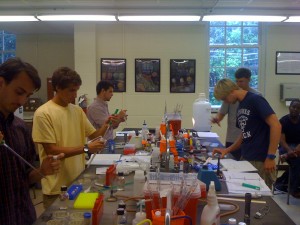This year’s Molecular Biology class is focusing on a year-long project in which Hampden-Sydney students isolate and characterize new mycobacteriophages from the environment. Mycobacteriophages are a type of virus that infect a specific kind of bacteria, including the variety responsible for tuberculosis. Learning more about the types of mycobacteriophage found in the environment can teach us a great deal about evolution as well as help to devise new ways to control tuberculosis bacteria populations. The course is a part of the Science Education Alliance (SEA), a group of ~80 institutions across the United States currently conducting this project as part of a larger initiative of the University of Pittsburgh and the Howard Hughes Medical Institute (HHMI). Students in the class have already found several varieties of new phage from soil samples that they have collected from around campus as well as their hometowns, and we will continue to post on the progress that is made here throughout the year!
Biology Department
individually tailored preparation for graduate and professional work

